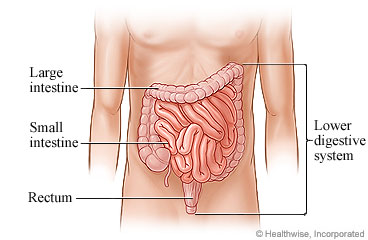
Overview
Crohn's disease is a lifelong inflammatory bowel disease. Parts of the digestive tract get swollen and irritated and may develop sores called ulcers. It usually occurs in the last part of the small intestine and the first part of the large intestine. But it can occur anywhere from the mouth to the anus.
The main symptoms of Crohn's disease are belly pain, diarrhea, fatigue, and weight loss. Some people may have constipation. It sometimes causes problems with joints, eyes, or skin. Symptoms may be mild, moderate, or severe. The disease can also go into remission. This means it is not active and there are no symptoms.
Bad attacks are often treated in the hospital with medicines and liquids through a tube in your vein (I.V.). This gives the digestive system time to rest and recover.
Talk with your doctor about the best treatments for you. You may need medicines that help prevent or treat flare-ups. You may need surgery to remove part of your bowel if you have an abnormal opening in the bowel (fistula), an abscess, or a bowel obstruction.
Self-care can help reduce your symptoms.
Follow-up care is a key part of your treatment and safety. Be sure to make and go to all appointments, and call your doctor if you are having problems. It's also a good idea to know your test results and keep a list of the medicines you take.
How can you care for yourself at home?
- Take your medicines exactly as prescribed. Call your doctor if you think you are having a problem with your medicine. You will get more details on the specific medicines your doctor prescribes.
- Do not take anti-inflammatory medicines, such as aspirin, ibuprofen (Advil, Motrin), or naproxen (Aleve). They may make your symptoms worse. Do not take any other medicines or herbal products without talking to your doctor first.
- Avoid foods that make your symptoms worse. These might include milk, alcohol, high-fiber foods, or spicy foods. It may help to keep a diary of foods that make symptoms worse.
- Make sure to get enough iron. Rectal bleeding may make you lose iron. Good sources of iron include beef, lentils, spinach, raisins, and iron-enriched breads and cereals.
- Drink liquid meal replacements if your doctor recommends them. These are high in calories and contain vitamins and minerals. Severe symptoms may make it hard for your body to absorb vitamins and minerals.
- Talk to a dietitian to make sure you are getting the nutrition, including vitamins and minerals, that you need.
- Do not smoke. Smoking makes Crohn's disease worse. If you need help quitting, talk to your doctor about stop-smoking programs and medicines. These can increase your chances of quitting for good.
- Stay up to date on all immunizations.
- Follow your doctor's cancer screening recommendations.
- Seek support from friends and family to help cope with Crohn's disease. The illness can affect all parts of your life. Get counseling if you need it.
When should you call for help?
Call 911 anytime you think you may need emergency care. For example, call if:
- You passed out (lost consciousness).
- Your stools are maroon or very bloody.
Call your doctor now or seek immediate medical care if:
- You have new or worse belly pain.
- You have a fever.
- You have new or worse nausea or vomiting.
- You have new or more blood in your stools.
- You cannot pass stools or gas.
- You have pus draining from the area around the anus, or pain and swelling in the anal area.
Watch closely for changes in your health, and be sure to contact your doctor if:
- You have new or worse symptoms, such as your diarrhea gets worse.
- You are losing weight.
- You do not get better as expected.
Where can you learn more?
Go to http://www.healthwise.net/patientEd
Enter Y197 in the search box to learn more about "Crohn's Disease: Care Instructions".
Current as of: October 19, 2024
Author: Ignite Healthwise, LLC Staff
Clinical Review Board
All Healthwise education is reviewed by a team that includes physicians, nurses, advanced practitioners, registered dieticians, and other healthcare professionals.

